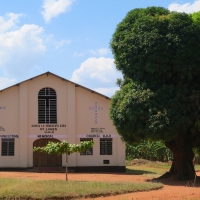 From north to south, from east to west, clockwise or a ‘figure of eight’, there are a hundred and one ways to travel through Africa. Despite all these different ways, many overlanders take similar routes. Routes along the highlights of the different countries, with occasional trips to the left or right. “Beaten overland trails,” you might say. We are riding the long version of the “Cairo to Cape Town” route. From Uganda or Kenya, this beaten trail travels through the famous national parks in northern Tanzania towards the Indian Ocean and the tropical island of Zanzibar. A route that we have already followed with great pleasure in 2007. This time we leave the beaten overland trail and remain in the West of Tanzania where we will first be looking for Livingstone.
From north to south, from east to west, clockwise or a ‘figure of eight’, there are a hundred and one ways to travel through Africa. Despite all these different ways, many overlanders take similar routes. Routes along the highlights of the different countries, with occasional trips to the left or right. “Beaten overland trails,” you might say. We are riding the long version of the “Cairo to Cape Town” route. From Uganda or Kenya, this beaten trail travels through the famous national parks in northern Tanzania towards the Indian Ocean and the tropical island of Zanzibar. A route that we have already followed with great pleasure in 2007. This time we leave the beaten overland trail and remain in the West of Tanzania where we will first be looking for Livingstone.
In 1858 the Royal Geographical Society sent two scientists, Burton and Speke, out to search for the source of the Nile. After a gruelling journey from Zanzibar through a country which is currently known as Tanzania they arrived at Lake Tanganyika in the west and later at Lake Victoria in the north. Speke named Lake Victoria as the source of the Nile, while Burton thought Lake Tanganyika should be it. This disagreement continued to exist after a second expedition. The members of the Society then decided on a new expedition. In 1866 Livingstone was sent out to verify the information provided by Burton and Speke.
Through letters Livingstone informed the scientists in London of his progress. 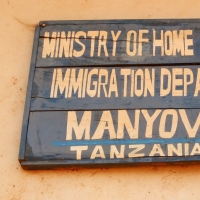 After two years, the flow of letters stopped and nothing was heard from Livingstone, he seemed to have disappeared from the face of the earth. An American newspaper decided to send one of its investigative journalists, Stanley, to search for Livingstone. Stanley travelled from Zanzibar via the same route through Tanzania to the west. When he stood eye to eye with Livingstone on the shores of Lake Tanganyika on 10 November 1871 he spoke the famous words, “Dr. Livingstone, I presume?“
After two years, the flow of letters stopped and nothing was heard from Livingstone, he seemed to have disappeared from the face of the earth. An American newspaper decided to send one of its investigative journalists, Stanley, to search for Livingstone. Stanley travelled from Zanzibar via the same route through Tanzania to the west. When he stood eye to eye with Livingstone on the shores of Lake Tanganyika on 10 November 1871 he spoke the famous words, “Dr. Livingstone, I presume?“
The meeting between Livingstone and Stanley took place in Ujiji, a small port on Lake Tanganyika near Kigoma. According to the stories ‘under the two mango trees’. Peter, in his heart an explorer, read the captivating stories of Livingstone and Stanley and wanted to stand underneath the same two mango trees overlooking the lake. Therefore we decided to skip the coast of Tanzania and remain in the West to go to Ujiji.
——————
From the border with Burundi we cross the border at Manyuvo. It is a small border crossing and clearly not busy, because the staff is sitting outside on a bench bent over checker board. From their seats they give us directions to where we can park. The youngest employee is sent in to handle the paperwork and stamp our papers. We pay $50 per visa and are allowed access to Tanzania for the next three months.
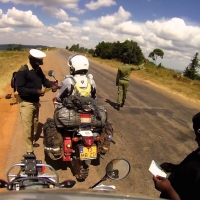 With fresh energy we ride into the thirteenth country on our journey. We are less than ten kilometres on the road when we are urged to stop by a fat policemen with a big white hat. The Tanzanian police are notorious for their senseless penalties and their search for ‘pocket money’. I stop next to the agent and give him the papers he asks for. He looks at everything at ease and then says: “This is a problem.” Yeah, here we have it. He shows me my insurance papers and points to the date: “valid from 13-02-2014 to 12-02-2014”. Heck, the man is right, those dates are not right. I feel awful. Although it is an apparent slip of the pen, he now has a reason to annoy us. He feels in his pockets and asks for a pen. Here comes the fine. But then happens something we both did not expect. “What you should do,” says the agent “is change the date with a pen”. I can just keep my mouth from dropping open in astonishment. He gives me back the papers, asks some questions about the motorbikes and then wishes us a safe journey. “Do not forget that date to change!” He shouts as he waves us a friendly goodbye.
With fresh energy we ride into the thirteenth country on our journey. We are less than ten kilometres on the road when we are urged to stop by a fat policemen with a big white hat. The Tanzanian police are notorious for their senseless penalties and their search for ‘pocket money’. I stop next to the agent and give him the papers he asks for. He looks at everything at ease and then says: “This is a problem.” Yeah, here we have it. He shows me my insurance papers and points to the date: “valid from 13-02-2014 to 12-02-2014”. Heck, the man is right, those dates are not right. I feel awful. Although it is an apparent slip of the pen, he now has a reason to annoy us. He feels in his pockets and asks for a pen. Here comes the fine. But then happens something we both did not expect. “What you should do,” says the agent “is change the date with a pen”. I can just keep my mouth from dropping open in astonishment. He gives me back the papers, asks some questions about the motorbikes and then wishes us a safe journey. “Do not forget that date to change!” He shouts as he waves us a friendly goodbye.
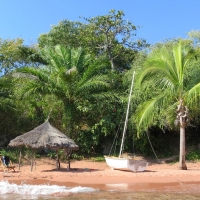 We continue our way and ride further to the lake. The closer we get to the lake, the lower we are and the hotter it gets. There are more and more palm trees along the road. Once we arrive in Kigoma at the end of the afternoon, we see the first glimpse of Lake Tanganyika after Burundi. We buy food and drinks for a couple of days before we drive to Jakobsen Beach Camp, a campsite just outside the city. The campsite is nestled in a forest and has three beautiful hidden beaches on the sparkling blue waters of Lake Tanganyika. We are the only ones on the campsite and feel like being the only inhabitants on a tropical island. A great alternative to Zanzibar, even with fresh water (as opposed to the salt water of the Indian Ocean). We swim in the warm water of the lake, lounge on the beach and enjoy the spectacular starry sky at night. What a paradise, no wonder Livingstone hide out here for so long!
We continue our way and ride further to the lake. The closer we get to the lake, the lower we are and the hotter it gets. There are more and more palm trees along the road. Once we arrive in Kigoma at the end of the afternoon, we see the first glimpse of Lake Tanganyika after Burundi. We buy food and drinks for a couple of days before we drive to Jakobsen Beach Camp, a campsite just outside the city. The campsite is nestled in a forest and has three beautiful hidden beaches on the sparkling blue waters of Lake Tanganyika. We are the only ones on the campsite and feel like being the only inhabitants on a tropical island. A great alternative to Zanzibar, even with fresh water (as opposed to the salt water of the Indian Ocean). We swim in the warm water of the lake, lounge on the beach and enjoy the spectacular starry sky at night. What a paradise, no wonder Livingstone hide out here for so long!
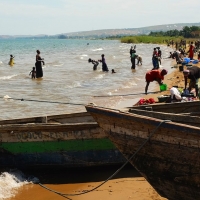 After a few lazy days on the beach, we swap our swimsuits for our motorgear and drive to Ujiji. The meeting of Stanley and Livingstone was close to the harbour. The port of Ujiji is small and does not consists of more than a number of large wooden ships that are moored in a shallower part of the lake. At the waterfront women are doing laundry, children are playing in the surf and fisher men are trying to catch their meal. This daily scene and also the model of the boats will probably not have changed a lot since the stay of Livingstone.
After a few lazy days on the beach, we swap our swimsuits for our motorgear and drive to Ujiji. The meeting of Stanley and Livingstone was close to the harbour. The port of Ujiji is small and does not consists of more than a number of large wooden ships that are moored in a shallower part of the lake. At the waterfront women are doing laundry, children are playing in the surf and fisher men are trying to catch their meal. This daily scene and also the model of the boats will probably not have changed a lot since the stay of Livingstone.
In the street to the harbour we find the Livingstone Museum. We are unlucky, because today the museum is closed. From behind the closed gate we have a look into the garden of the museum and see the big mango trees. So there it was. Although we cannot sit under the mango trees, it still is a special to be there. Even now, after all this time, it is not difficult to picture their special meeting at this beautiful place.
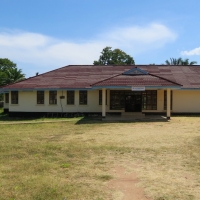 We stay on the beach at Jakobsen Beach Camp for two more days and than start the rougher part of the route through Tanzania. We stay in the west and drive through a sparsely populated part of Tanzania and through Katavi National Park. It is not as remote and deserted as around Lake Turkana (between Ethiopia and Kenya), but certainly not a main road. This is already evident from the fact that we will be driving on unpaved roads for the greater part. In Kigoma we buy enough food and water for a few days and refuel, before we drive the first stage to Uvinza.
We stay on the beach at Jakobsen Beach Camp for two more days and than start the rougher part of the route through Tanzania. We stay in the west and drive through a sparsely populated part of Tanzania and through Katavi National Park. It is not as remote and deserted as around Lake Turkana (between Ethiopia and Kenya), but certainly not a main road. This is already evident from the fact that we will be driving on unpaved roads for the greater part. In Kigoma we buy enough food and water for a few days and refuel, before we drive the first stage to Uvinza.
That first piece is still on asphalt, but once we have crossed the bridge Uvinza we drive onto a narrow sandy dirt road. After a few hundred meters my bikes swirls from left to right in the deep sand and after I have almost fallen three times, we stop to let air out of the tires. With the softer tires we have much more grip in the sand and driving becomes a lot easier. Still, driving through sand is not my favourite ’exercise’. With a red head, sloshing armpits and my teeth gritted together I follow the tracks of Peter.
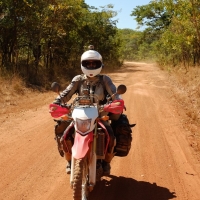 Fortunately, the pieces with deep sand are interspersed with gravel and stretches of harder sand. This gives me more time to look around. It seems like spring, the trees are full of fresh green leaves and the roadside is purple and pick with flowers. At various places we look out over the vast plains where the road winds through like a white line. We hardly meet any other traffic. Only around the villages we see some small trucks and people on bicycles, but even the villages can be counted on one hand.
Fortunately, the pieces with deep sand are interspersed with gravel and stretches of harder sand. This gives me more time to look around. It seems like spring, the trees are full of fresh green leaves and the roadside is purple and pick with flowers. At various places we look out over the vast plains where the road winds through like a white line. We hardly meet any other traffic. Only around the villages we see some small trucks and people on bicycles, but even the villages can be counted on one hand.
The sun is already high in the sky and there is no wind. It is pretty hot. We stop here and there to take some pictures and find a spot in the shade to eat. But no extensive lunch in this heat. The chocolate cookies are melting away in front of our eyes, which is a good reason to eat the whole pack. We fill up our camel baks and drive on.
After more than 300 kilometres, of which the last 200 kilometres on the dusty road, we arrive in Mpanda at the beginning of the evening. We are covered in dust and have ’helmet hair’ that sticks to our sweaty heads. We enter the reception of the Super City Hotel. The staff looks at us from head to toe, but seems accustomed to these kind of dusty appearances. They show us to a room on the first floor. It is a case of ‘African Standard’, with a sagging bed, cold water, a leaking toilet and very noisy neighbours. But all of that should not spoil the fun. We take a refreshing cold shower and sit down on the terrace for a big plate of pasta. It tastes extra delicious today. Armed with earplugs we crawl under the mosquito nets and fall into a deep sleep while our beds gently vibrates on the rhythm of the music of the neighbours.
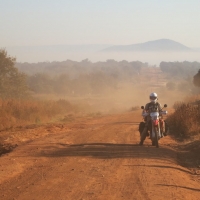 We wake up early the next morning and suspect that our downstairs neighbours have not been to bed at all. We have a long day ahead of us today with more than 200 kilometres on unpaved roads, so it is not a bad thing that we woke up so early. We strap all our stuff on the bikes, eat an omelet at the restaurant of the hotel and leave early. Just outside the city we arrive at the border of the Katavi National Park. A nature park that holds different wild animals, including elephants and lions. The public road runs right through the park, so we are actually on safari. The road in the park is particularly bad with many pieces ‘corrugations’: large ridges that resemble to an old-fashioned washboard. We bounce over the bumps with the bikes and have the idea they slowly vibrate apart. It is best to have a considerable momentum to drive over the bumps so we only touch the tops of the ridges, but we cannot do that everywhere because of the deep holes in the road we have to navigate around. All in all, we must keep watching the road and have little opportunity to look for a trunk or wild manes while driving.
We wake up early the next morning and suspect that our downstairs neighbours have not been to bed at all. We have a long day ahead of us today with more than 200 kilometres on unpaved roads, so it is not a bad thing that we woke up so early. We strap all our stuff on the bikes, eat an omelet at the restaurant of the hotel and leave early. Just outside the city we arrive at the border of the Katavi National Park. A nature park that holds different wild animals, including elephants and lions. The public road runs right through the park, so we are actually on safari. The road in the park is particularly bad with many pieces ‘corrugations’: large ridges that resemble to an old-fashioned washboard. We bounce over the bumps with the bikes and have the idea they slowly vibrate apart. It is best to have a considerable momentum to drive over the bumps so we only touch the tops of the ridges, but we cannot do that everywhere because of the deep holes in the road we have to navigate around. All in all, we must keep watching the road and have little opportunity to look for a trunk or wild manes while driving.
After 50 kilometres we reach the end of the park without ever having seen any animal. Not even antelope or birds. 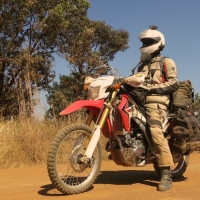 This is not only because of the poor condition of the road, but also by the fact that a large part of the park was burnt. We often see that the grass along the road is “mown” by burning it. Sometimes it still burns when we pass and we need to hold our breath as we drive through the thick smoke. The grass along the road can become more than two meters high, which makes it difficult to see animals and people crossing the road., so it is not a bad idea to trim that high grass, but in the park they went about it very rigorously. On both sides of the road at least 50 meters and sometimes even 100 meters was burnt. Not only does high grass disappear, but also many trees and shrubs are gone. And with that vegetation also the animals left. Very unfortunate, we hope to see more during a next safari.
This is not only because of the poor condition of the road, but also by the fact that a large part of the park was burnt. We often see that the grass along the road is “mown” by burning it. Sometimes it still burns when we pass and we need to hold our breath as we drive through the thick smoke. The grass along the road can become more than two meters high, which makes it difficult to see animals and people crossing the road., so it is not a bad idea to trim that high grass, but in the park they went about it very rigorously. On both sides of the road at least 50 meters and sometimes even 100 meters was burnt. Not only does high grass disappear, but also many trees and shrubs are gone. And with that vegetation also the animals left. Very unfortunate, we hope to see more during a next safari.
We ride further south through a couple of small villages and then turn west again to go to the lake one more night. We notice by the reaction of people along the road that this area is not visited by tourists frequently, certainly not on motorbikes. Once we stop to do some shopping, we are the attraction of the day. In the market area all activities stop and everyone turns in our direction to watch us. It does give us the opportunity to take some nice pictures. We drive on to Kipili, a small fishing village on Lake Tanganyika where we find a camping spot at a beautiful lodge. 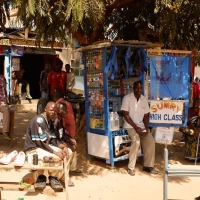 We pitch our tent under three huge mango trees. We take a refreshing dip in the lake and enjoy the sunset from the deck chairs on the terrace while relaxing lounge music is playing in the back. A beautiful place and a huge contrast to the Super City Hotel where we slept the previous night!
We pitch our tent under three huge mango trees. We take a refreshing dip in the lake and enjoy the sunset from the deck chairs on the terrace while relaxing lounge music is playing in the back. A beautiful place and a huge contrast to the Super City Hotel where we slept the previous night!
From Kipili we drive back to the main road, where we leave the dusty roads temporarily behind us. The bulk of the day we drive on tarmac. Everywhere on the route we cross police checkpoints. Fixed checkpoints where a barrier is put across the road and the policemen are sitting in a hut along the road waiting for the next vehicle. Usually, they want to see our papers and ask some questions: “Where are you from?”, “Where are you heading today?”. On the dirt roads we only saw only two checkpoints. Now we are back on the tarmac, the number of checkpoints has increased significantly. Just like the first police checkpoint, most policemen are very friendly. We do not come across any difficulties, often they just wave us through. So far we have not seen the bad reputation of the Tanzanian police in effect.
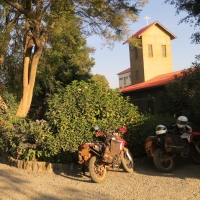 At the end of the day we arrive in Sumbawanga, where we find a room at the Moravian Church Conference Center. The large building looks like a monastery and our room is reminiscent of a monk’s cell with a tight-made bed, a closet, a desk with a chair and a bible on the shelf. The Christian faith is strongly represented throughout Africa. Especially in Tanzania we pass many places where you can “spend the night at the church.” Often at a Christian mission that has several rooms or a place to camp. You might not immediately expect it, but even this is directly linked to Livingstone. Besides explorer he primarily was a missionary. During his journeys through Africa, he opened several missions and, particularly in the south east of Africa, he tried to open up to Christianity. Not only in Sumbawanga, but also the next day in Mbeya we find a place to stay in the shadow of a church. From the rehearsal room, we hear a gospel choir rehearsing for the next mass. It sounds wonderful and swings a lot more than the songs we heard earlier in Rome.
At the end of the day we arrive in Sumbawanga, where we find a room at the Moravian Church Conference Center. The large building looks like a monastery and our room is reminiscent of a monk’s cell with a tight-made bed, a closet, a desk with a chair and a bible on the shelf. The Christian faith is strongly represented throughout Africa. Especially in Tanzania we pass many places where you can “spend the night at the church.” Often at a Christian mission that has several rooms or a place to camp. You might not immediately expect it, but even this is directly linked to Livingstone. Besides explorer he primarily was a missionary. During his journeys through Africa, he opened several missions and, particularly in the south east of Africa, he tried to open up to Christianity. Not only in Sumbawanga, but also the next day in Mbeya we find a place to stay in the shadow of a church. From the rehearsal room, we hear a gospel choir rehearsing for the next mass. It sounds wonderful and swings a lot more than the songs we heard earlier in Rome.
Then we already start our last day in Tanzania. From Mbeya we drive to the border with Malawi, a country we heard good stories about and we look forward to visit. We cruise on a new asphalt road along the Tanzanian hills and have enough time to look around. 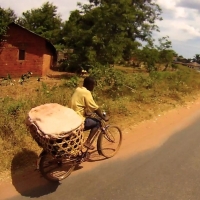 There is a bit more traffic on the road than the previous days. Around the villages we mainly see people on small motorbikes and bicycles. It keep surprising us how many things they can carry on their luggage racks; baskets of live chickens, crates of bottled drinks, long bamboo poles and corrugated iron. On the main highway from Mbeya it is a lot busier and we drive between large trucks with trailers that go to Dar-Es-Salaam.
There is a bit more traffic on the road than the previous days. Around the villages we mainly see people on small motorbikes and bicycles. It keep surprising us how many things they can carry on their luggage racks; baskets of live chickens, crates of bottled drinks, long bamboo poles and corrugated iron. On the main highway from Mbeya it is a lot busier and we drive between large trucks with trailers that go to Dar-Es-Salaam.
We again come across yet another police checkpoint. However, this one looks slightly different. No barrier on the road, but a police officer in the middle of the road with a laser gun in his hands! We slow down as we ride towards him and stop to say a friendly hello. Our friendly greeting is not answered. The agent looks particularly angry and sends us to the side of the road. He holds the device in front of Peter and shows that he was driving 56 km/hour. Fine, because you can do 80 km/hour on this road. But no, today this is a 50km/hour road. Usually a sign clearly shows the 50km- of 80km-zones, but here we did not see any sign. If we make a remark about the lack of signs, the man adds that this ’an area with villages’ and we were therefore only allowed to drive 50km/hour. Whatever. The agents does not respond to our remarks and writes a ticket for Peter. I get off with a warning.
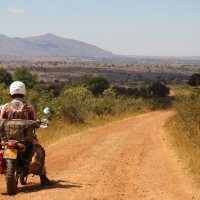 Peter has to pay 30,000 shillings, which is about €15. Unfortunately, we have spent all of our shilling the night before. Riding to the ATM is too far. We can pay in American dollars, says the policemen while we see imaginary dollar signs glistening in his eyes. It takes some time before we finally agree with the agent and his boss at the head office on the exchange rate. We pay him the dollars and he hands over the ticket gracefully, welcoming us to Tanzania with a smile. After more than an hour after we arrived at the checkpoint, we get back on the bikes and continue our way towards Malawi with a nasty after-taste about this final checkpoint and our first ticket. While the bikes are buzzing monotonously the thoughts of the smiling dollar-loving policemen are slowly replaced by images of the beach at Jakobsen Beach Camp, the port of Ujiji and dusty road to Mpanda. A smile returns to my face, it was fun in Tanzania …
Peter has to pay 30,000 shillings, which is about €15. Unfortunately, we have spent all of our shilling the night before. Riding to the ATM is too far. We can pay in American dollars, says the policemen while we see imaginary dollar signs glistening in his eyes. It takes some time before we finally agree with the agent and his boss at the head office on the exchange rate. We pay him the dollars and he hands over the ticket gracefully, welcoming us to Tanzania with a smile. After more than an hour after we arrived at the checkpoint, we get back on the bikes and continue our way towards Malawi with a nasty after-taste about this final checkpoint and our first ticket. While the bikes are buzzing monotonously the thoughts of the smiling dollar-loving policemen are slowly replaced by images of the beach at Jakobsen Beach Camp, the port of Ujiji and dusty road to Mpanda. A smile returns to my face, it was fun in Tanzania …
Distance to Mbeya: 19.227km (11,947 miles)
Click here to view the photos.
PS: On the journey of Burton and Speke a beautiful film was made called “Mountains of the Moon’. The book “Into Africa: The Epic Adventures of Stanley and Livingstone” (by Martin Dugard) describes Livingstones expedition to the source of the Nile, his “disappearance” and the quest of Stanley for Livingstone that followed.
Previous story “Very short visit” – Next story “Malawi, above the water and underwater“





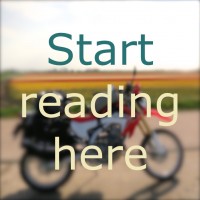
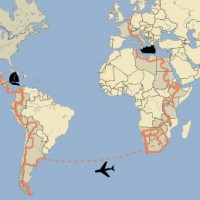
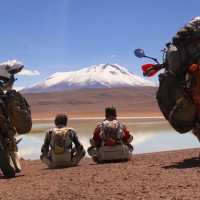
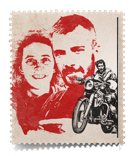
Hi guys,
Love the photos and the blog, was just wondering what time of year you did this route and if you think an old land rover would make it… But particularly if it’s worth it. You don’t seem to have seen much wildlife, I thought it was the whole point of that route? Anyway we’re trying to decide between that route and going east along the coast before going to Malawi from Rwanda! Thanks!
Tristan
Hoi Peter en Leonie, leuk om jullie gister ontmoet te hebben in Joe’s, inspirerende verhalen! Heel veel succes met de verdere reis en ik ben natuurlijk heel benieuwd hoe jullie naar Zuid-Amerika vertrekken…per waterscooter…vliegtuig…cruise…succes! Groetjes Marlous (Explore-Namibia)
Het is vandaag 29 september: Leonie van harte gefeliciteerd met je verjaardag. Waar je ook bent, een fijne avond nog gewenst. Peter ook gefeliciteerd. Hartelijke groet vanuit een regenachtig Castricum, Ben en Anja
Een mooi verhaal, we weten niet wanneer je weer op de site kijkt maar het is nu 28 september. Voor jou Leonie oudjaarsdag. Al vast van harte gefeliciteerd. Maak er iets bijzonders van. Geldt uiteraard ook voor jou Peter.
groeten van Rein en Janny uit Barneveld.
Heerlijk verhaal weer, groetjes aan je vader
Dikke kus xxx
Gelukkig, toch nog een dubieuze agent ;-).
Zou toch jammer zijn als die beloofde ervaring je wordt onthouden…
xxx
Blij weer iets te horen (soms vraag je je af…),
weer een schitterend stuk.
Veel plezier,
gr Herman
p.s. Ad heeft vannacht zijn laatste nachtdienst en dan pensioen.